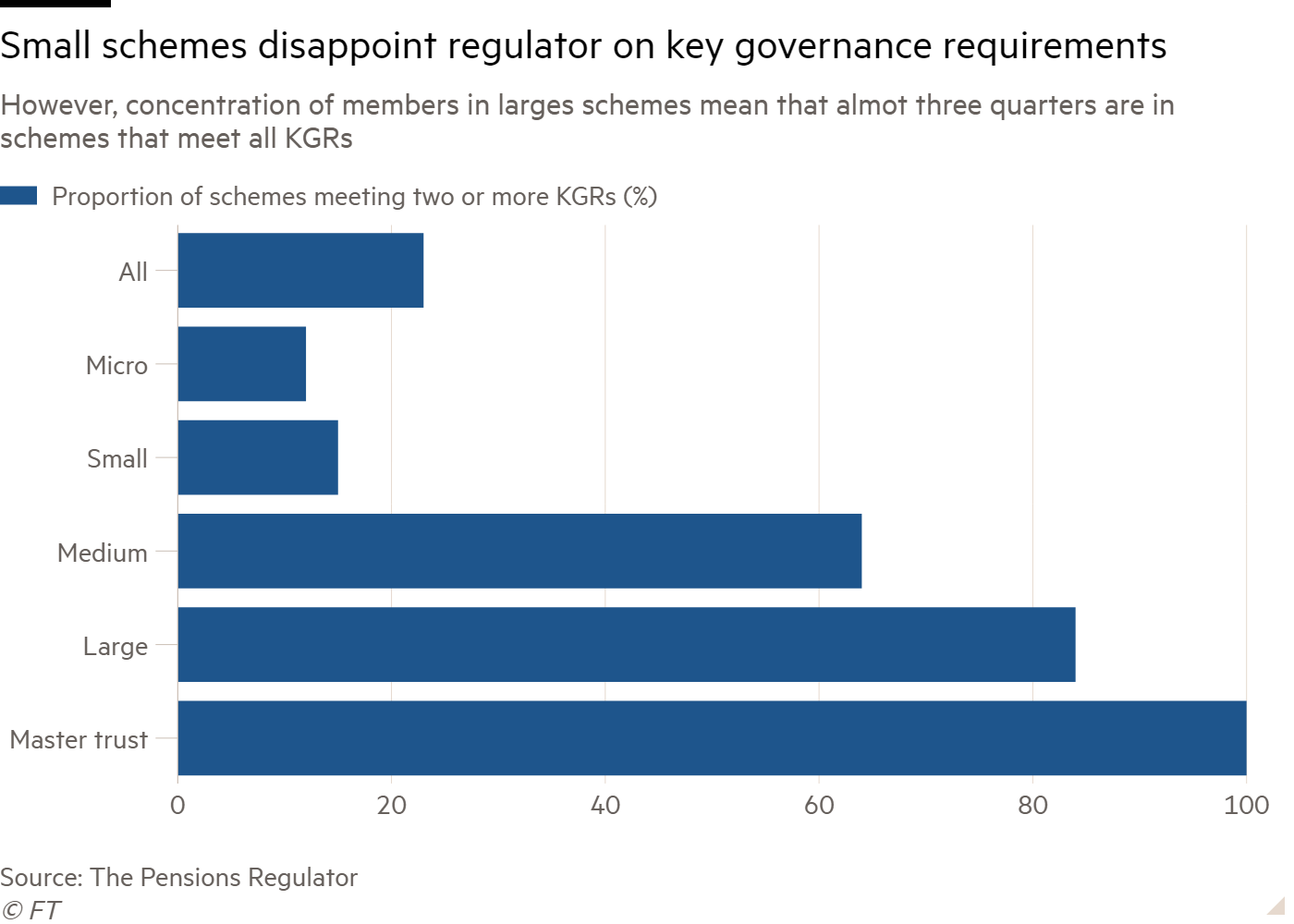The Pensions Regulator continued to press for consolidation on Thursday, after its annual survey found 99 per cent of small schemes are missing statutory governance requirements.
The regulator urged smaller schemes to quit the market to make way for master trust expansion.
The survey revealed that 99 per cent of small schemes (with between 12 and 99 members) and 96 per cent of micro schemes (with between 2 and 11 members) were missing statutory trusteeship rules.
“These figures clearly show that people saving for their retirement are generally far better served by big schemes than small,” said David Fairs, TPR’s head of regulatory policy.
He reiterated the urgency for small schemes with poor governance to exit the market. “We need to reduce the number of poorly run schemes so that no saver’s retirement is put at risk by bad scheme governance.”
We need to reduce the number of poorly run schemes so that no saver’s retirement is put at risk by bad scheme governance
David Fairs, The Pensions Regulator
The overall findings were more positive, with 71 per cent of all savers enrolled in schemes that are hitting governance targets, according to the survey of 447 schemes by OMB Research.
But Mr Fairs said many savers in smaller schemes are at risk. “This long tail of smaller schemes which do not meet the standards we expect is simply unacceptable.”
‘The regulator should roll its sleeves up’
The regulator said the findings justified its policy direction, which encourages consolidation.
This year, TPR has ramped-up engagement and communication activities by writing to 500 smaller schemes.

Louise Sivyer, TPR’s policy manager, said it was now “actively encouraging consolidation” and making clear to smaller schemes “we do have the ability to take enforcement action”.
In the absence of more affirmative action from government, TPR appears forced to resort to sabre rattling in order to get trustees to pay attention
Tom Selby, AJ Bell
Anna Copestake, partner at ARC Pensions Law, said TPR should not be afraid to use its powers to protect member savings.
“For disengaged trustees at that end of the market, that’s where we really need to see a tougher regulator. We need them to roll their sleeves up and exercise their powers – whether that’s wind-up or appointing more-experienced trustees to the board,” she said.
Legislate small schemes away?
But forced consolidation, legislated by the Department for Work and Pensions, might be necessary to protect members trapped in poorly governed schemes, according to some industry figures.
“In the absence of more affirmative action from government, TPR appears forced to resort to sabre rattling in order to get trustees to pay attention,” said Tom Selby, senior analyst at AJ Bell.
He added: “You have a pretty difficult situation here where there is clear evidence that small schemes are, on average, failing members, but the DWP is either unable or unwilling to act to force consolidation.”
However, others expressed concern that well-governed smaller schemes could be put in jeopardy for the misdeeds of others.
“Although indicators of good governance are concentrated amongst larger schemes, partly owing to the benefits of scale, it is quality and not the size of the scheme that matters,” said Caroline Escott, policy lead for investment and stewardship at the Pensions and Lifetime Savings Association.
She continued: “There are smaller schemes which are well run and offer good value for money.”
Ms Sivyer said TPR’s consultation on the future of trusteeship and governance, which runs until September 24 this year, might lead to “a conversation with the DWP” on how to further remove barriers to consolidation.
The DWP held a consultation on DC consolidation between February and April this year, but is yet to release a statement in response.
Climate inaction
The survey also revealed that only 21 per cent of schemes were accounting for climate risk in their investment decision-making processes.
The report has landed just two months before the October arrival of new regulations mandating trustees to update their scheme’s statement of investment principles to set out their policies on environmental, social and governance considerations, including climate change.
Campaigners said the “disappointing” figures justified the incoming rules.
“The findings of this research are disappointing – that only 21 per cent of schemes integrate climate risk into their investment approach is just not good enough, particularly given that in DC schemes members bear the investment risks,” said Fergus Moffatt, head of UK policy at ShareAction.
Research from the think tank Carbon Tracker warns that the global economy could face trillions of pounds in “stranded assets” as a result of climate change, which is likely to hurt the balance sheets of pension funds.
Mr Moffat said trustees would need to wake up to climate risk or face financial and regulatory consequences. “New guidance from the Pensions Regulator will also help, but trustees with their heads in the sand after this date could face regulatory action if they fail to act in members’ best interests.”

























